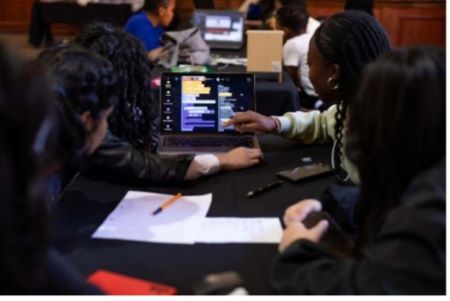Seliphar Machoni
In the embrace of collective harmony, members of the Navakholo Disability Initiative Group in Kenya brave the chilly weather, bending in unison to harvest arrowroots and sweet potatoes from their farm. This poignant celebration is underscored by joyous songs, marking the triumph of their bountiful harvest.
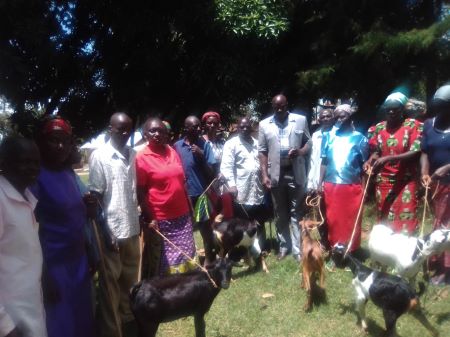
Some of the group members in a physical meeting
With a shared goal of self-sufficiency, education, healthcare, and dispelling misconceptions about disability, the group, comprising 50 differently-abled individuals and guardians of impaired children, has thrived for eight years.

Mr. Barthez Wechuli, leader of the group(PC. Barthez Wechuli
Navakholo Disability Initiative Group is a group based in Kakamega County in Kenya. According to Mr. Barthez Wechuli, the group’s chairperson, their focus on agriculture stems from its diverse opportunities, providing sustenance and enabling them to sell produce for medical bills and education.”We decided to practice agriculture because we wanted something that would sustain us and make our lives comfortable. Through agriculture, we are able to sell our farm produce and animals to provide capital for hospital bills, education, and economic empowerment,” Wechuli explained.
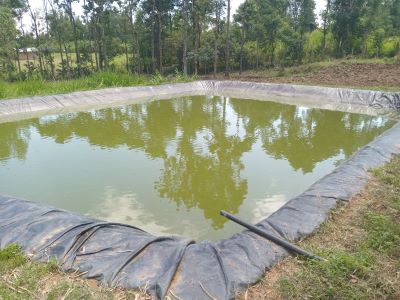
Fish pond/farming by the group
Wechuli siad the group is involved in farming various crops such as bananas, sweet potatoes (which also serve as a cover crop holding soil together), arrowroots, vegetables, and domestic animals including dairy goats, dairy cows, and hens. They also rear fish in three fish ponds, with a ready market for their produce.
“We sell our farm produce for income, and our primary supporters are community members. 80% of our customers come from the community. In December, we harvested fish, and even before the harvest, community members were lined up to buy them. We also have customers outside Kakamega county, particularly in Nairobi, for arrow roots and sweet potatoes,” he stated.
He added that aside from the community, they supply farm produce like vegetables to schools in the sub-county. Additionally, they use the farm produce to pay for school fees, particularly for some disabled children. Jonathan Mukwe, the father of Claris Mukwe, a visually impaired member of the group, appreciates the assistance provided by the group in education and healthcare. Mukwe, whose land contributes to the group’s farming activities, including arrowroots and vegetables, highlights the significant impact on his daughter’s well-being.
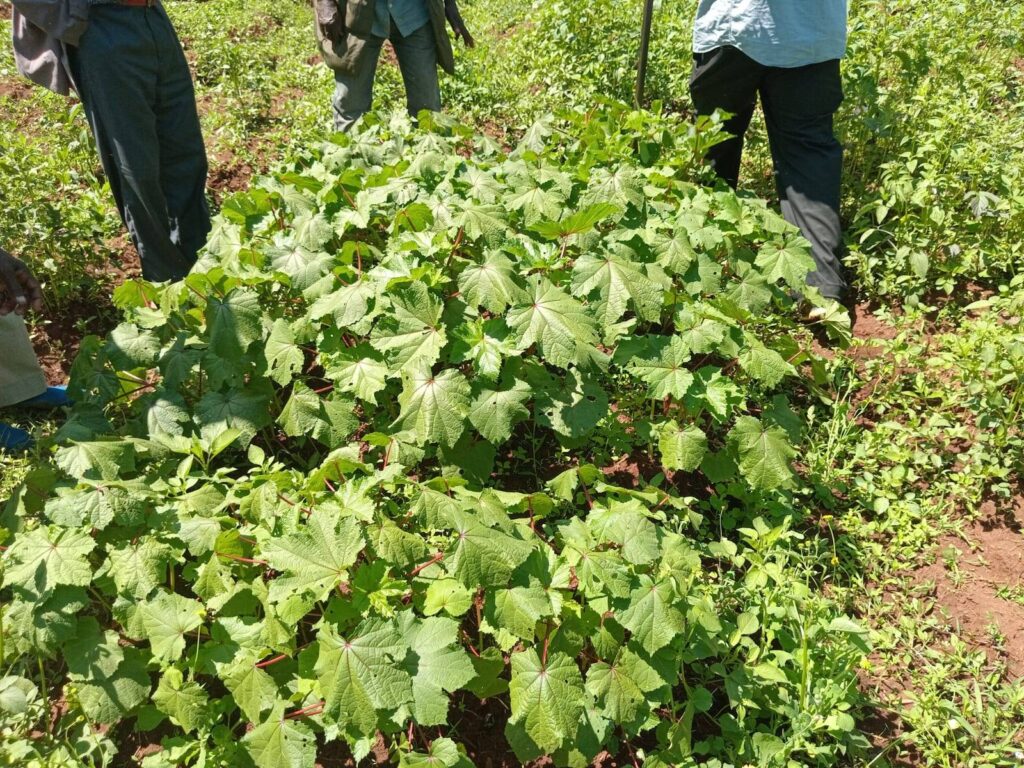
“As a parent of a disabled child, the challenges in terms of medication, education, and even food were immense before my child joined the group. The initiative has been invaluable; my daughter received timely medication and completed her secondary education through the group’s support,” Mukwe said.
Recognizing the group’s role in addressing food security, not just in their community but throughout Kakamega county, Mr. Mukwe offered his land for the group’s farming activities.He emphasizes the productivity of his soil, conducive for various crops, including arrowroots that sell at Ksh 15,000 per sack (18-20 sacks per half an acre) and sweet potatoes generating substantial income, with a quarter-acre yielding Ksh 31,000.
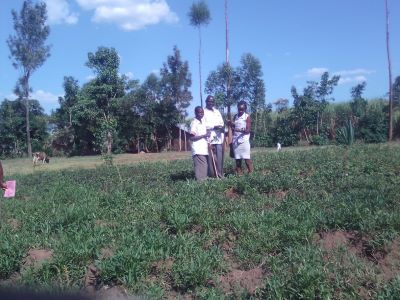
Members harvesting sweet potatoes
The benefits accrued from these crops are utilized by group members to cover school fees and medical expenses. Additionally, Mukwe noted the nutritional value of the crops, particularly sweet potatoes and arrowroots, contributing to the overall health and well-being of the community.According to healthline.com, arrow roots may aid weight loss as the powder comprises 32 percent resistant starch, which the body cannot digest. It forms a viscous gel when mixed with water and acts like soluble fiber in your gut.
Mr. Benach Weta, an agricultural expert and a member of the group, emphasizes the resilience of the crops planted, specifically mentioning climate-resilient varieties like sweet potatoes and arrowroots.”Arrowroots can thrive anywhere provided there is enough moisture in the soil for their normal growth and development,” Benach stated, underscoring the adaptability of these crops to diverse environmental conditions. On the inventive initiatives of the group, Benach applauds their resourcefulness in fish farming in self-made ponds and the creation of a water pump system.
“The group has come up with many innovative ideas that have a great impact on their lives and help to sustain themselves. For instance, we have a fish pond made from plastic paper, and they devised a method to pump water into the fish pond by connecting water pipes from catchment areas. Using a pump, they supply water to the pond. Fish take six months to reach maturity, becoming ready for consumption and the market. Additionally, the group runs a hen-keeping project where they raise one-day-old chicks in a well-lit room for brooding, taking three months to grow.”
Benach advised the group to focus on crops or livestock with early maturity and the ability to withstand diseases and pests. He specifically recommends a thrice-yearly vaccination routine for chickens, contributing valuable insights to the group’s sustainable agricultural practices. Kevin Makechi, a community member and a longstanding customer of the group since the initiation of their project, attests to exclusively sourcing all his market products from the group’s farm produce.
“From where I stay to the market is a bit far, and instead of walking a long distance to buy vegetables, bananas, and arrowroots for my home consumption, I obtain them from the group. I would say the group is a savior to the community; we consume what comes from their farm. I am also a businessman, supplying fish, sweet potatoes, and arrowroots to my customers at Kakamega market—all these products are acquired from the community. As a community member buying from them, I also support their initiative because it has changed how people used to view the disabled,” Makechi stated.
The group’s farming activities received a significant boost when the county government of Kakamega provided them with a water pump and improved varieties of tissue culture bananas and rice seeds.
“The Kakamega county government through the ministry of Agriculture and Fisheries has been of great help to our group. They gave us improved tissue culture bananas, which grow faster compared to other varieties, taking two years to grow and start producing bananas. Additionally, for our fish pond activities, the county government added a water pump to facilitate water pumping,” Wechuli, the group chairperson confirms.
In addition to the support from the county government, the group acknowledges assistance from the national government through the National Council of Disability. The support includes funding for the dairy goat project, which began with 15 goats and has now expanded to 85. The National Council of Disability also provides valuable training on crop cultivation, livestock rearing, hen-keeping, and economic empowerment.
Appreciative Wechuli said “They also offer us with training on how to grow crops and rear livestock and hens, and also, we get trained on how to be economically empowered.”
Highlighting the broader impact, Wechuli notes that the group’s efforts actively contribute to four of the 17 United Nations Sustainable Development Goals: SDG 1 (reducing poverty), SDG 2 (reducing hunger and malnutrition), SDG 13 (climate action), and SDG 17 (partnership for development).
Photo credits: Navakholo Disability Initiative Group




